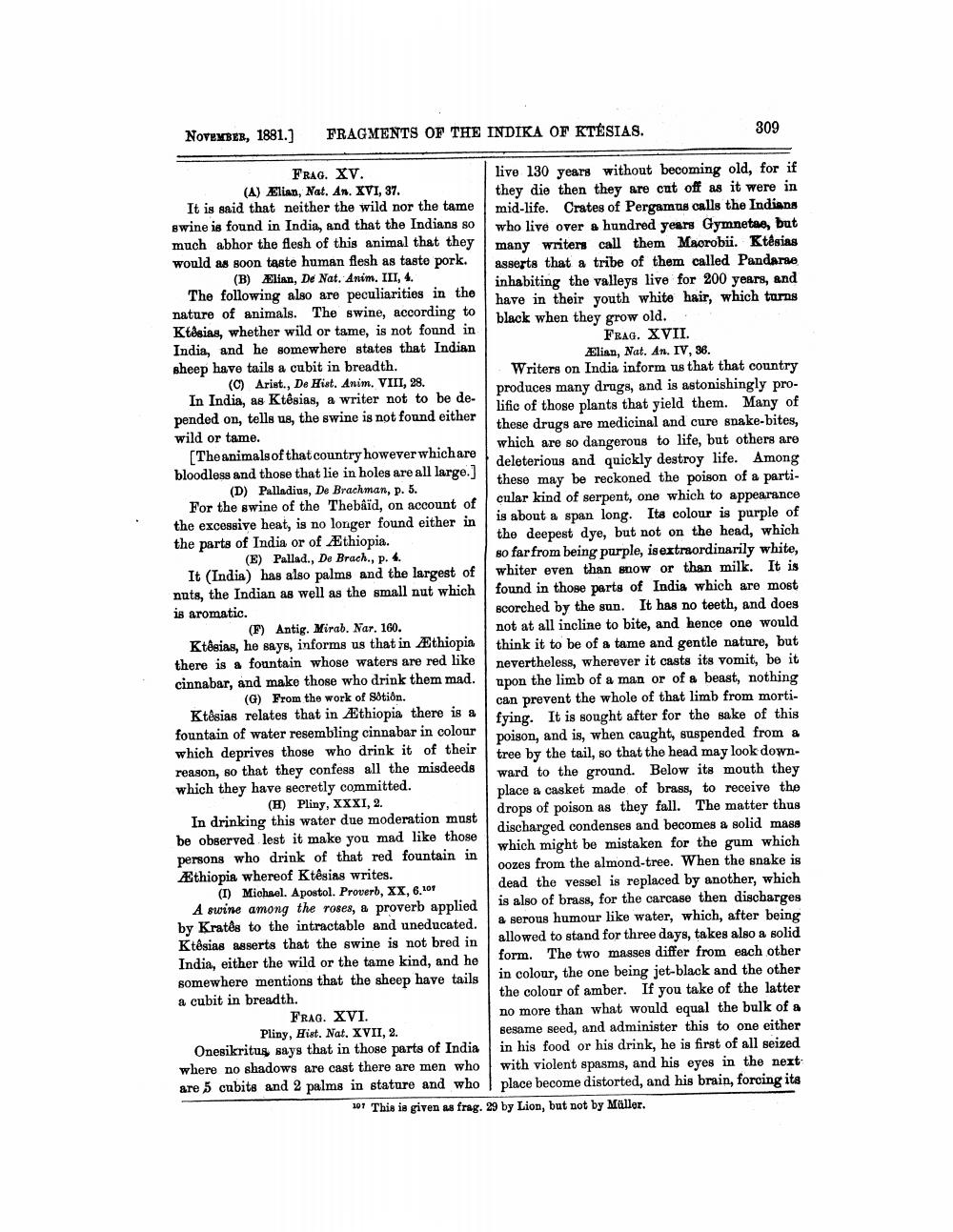________________
NOVEMBER, 1881.]
FRAGMENTS OF THE INDIKA OF KTÉSIAS.
FRAG. XV.
(A) Elian, Nat. An. XVI, 37.
It is said that neither the wild nor the tame swine is found in India, and that the Indians so much abhor the flesh of this animal that they would as soon taste human flesh as taste pork.
(B) Elian, De Nat. Anim. III, 4.
The following also are peculiarities in the nature of animals. The swine, according to Ktêsias, whether wild or tame, is not found in India, and he somewhere states that Indian sheep have tails a cubit in breadth.
(C) Arist., De Hist. Anim. VIII, 28. In India, as Ktêsias, a writer not to be depended on, tells us, the swine is not found either wild or tame.
[The animals of that country however which are bloodless and those that lie in holes are all large.] (D) Palladius, De Brachman, p. 5.
For the swine of the Thebâïd, on account of the excessive heat, is no longer found either in the parts of India or of Ethiopia.
(E) Pallad., De Brach., p. 4.
It (India) has also palms and the largest of nuts, the Indian as well as the small nut which is aromatic.
(F) Antig. Mirab. Nar. 160.
Ktêsias, he says, informs us that in Ethiopia there is a fountain whose waters are red like cinnabar, and make those who drink them mad. (G) From the work of Sôtion.
Ktêsias relates that in Ethiopia there is a fountain of water resembling cinnabar in colour which deprives those who drink it of their reason, so that they confess all the misdeeds which they have secretly committed. (H) Pliny, XXXI, 2. In drinking this water due moderation must be observed lest it make you mad like those persons who drink of that red fountain in Ethiopia whereof Ktêsias writes.
(I) Michael. Apostol. Proverb, XX, 6.101 A swine among the roses, a proverb applied by Krates to the intractable and uneducated. Ktêsias asserts that the swine is not bred in India, either the wild or the tame kind, and he somewhere mentions that the sheep have tails a cubit in breadth.
FRAG. XVI.
Pliny, Hist. Nat. XVII, 2.
Onesikritus, says that in those parts of India where no shadows are cast there are men who are 5 cubits and 2 palms in stature and who
309
live 130 years without becoming old, for if they die then they are cut off as it were in mid-life. Crates of Pergamus calls the Indians who live over a hundred years Gymnetae, but many writers call them Macrobii. Ktêsias asserts that a tribe of them called Pandarae inhabiting the valleys live for 200 years, and have in their youth white hair, which turns black when they grow old.
FRAG. XVII.
Elian, Nat. An. IV, 36.
Writers on India inform us that that country produces many drugs, and is astonishingly prolific of those plants that yield them. Many of these drugs are medicinal and cure snake-bites, which are so dangerous to life, but others are deleterious and quickly destroy life. Among these may be reckoned the poison of a particular kind of serpent, one which to appearance is about a span long. Its colour is purple of the deepest dye, but not on the head, which so far from being purple, is extraordinarily white, whiter even than snow or than milk. It is found in those parts of India which are most scorched by the sun. It has no teeth, and does not at all incline to bite, and hence one would think it to be of a tame and gentle nature, but nevertheless, wherever it casts its vomit, be it upon the limb of a man or of a beast, nothing can prevent the whole of that limb from mortifying. It is sought after for the sake of this poison, and is, when caught, suspended from a tree by the tail, so that the head may look downward to the ground. Below its mouth they place a casket made of brass, to receive the drops of poison as they fall. The matter thus discharged condenses and becomes a solid mass which might be mistaken for the gum which oozes from the almond-tree. When the snake is Idead the vessel is replaced by another, which is also of brass, for the carcase then discharges a serous humour like water, which, after being allowed to stand for three days, takes also a solid form. The two masses differ from each other in colour, the one being jet-black and the other the colour of amber. If you take of the latter no more than what would equal the bulk of a sesame seed, and administer this to one either in his food or his drink, he is first of all seized with violent spasms, and his eyes in the next place become distorted, and his brain, forcing its
107 This is given as frag. 29 by Lion, but not by Müller.




